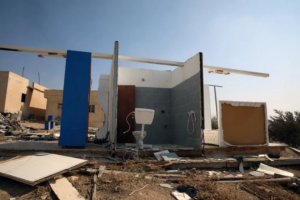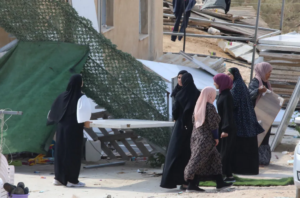My Bedouin village was destroyed so that Israel can build a Jewish village in its place

Residents of Umm al-Hiran dismantle their homes in November 2024
Raad Abu al-Kiyan writes in Haaretz on 10 January 2025:
I’m a resident of Umm al-Hiran, and in recent years, the head of the village local committee. I’m 46 years old, married with eight children (six girls, two boys), and I work as an enviromentalist in Be’er Sheva. This past November 14, I also became an “evacuee.” That’s a familiar status in the country over the past year – the difference being that Bedouin evacuees, unlike members of Jewish communities who were evacuated from their homes because of the war, do not receive support from any public authority – not of a financial, educational or social-welfare nature. Our situation really is different. I was evicted from my village and my home so that the state can build a village and a home for others in its place, while I was obligated to demolish my family’s home with my own hands.
Since the eviction, I’ve been living in the nearby Bedouin town of Hura. All the displaced residents of Umm al-Hiran are now in Hura, some living with relatives, and some in aluminum shacks that lack any regular supply of either water or electricity, and without any legal title to a home.
My family has lived in Umm al-Hiran since the 1950s, which is when the government brought us there, after we and other members of the Abu al-Kiyan tribe were uprooted from our historical land in Wadi Subala in the northern Negev. Ostensibly, we were moved because the army needed our land; eventually, however, it was annexed to Kibbutz Shoval. And now history is repeating itself, and the residents of Umm al-Hiran are again being evicted to make way for the establishment of the Jewish community of Dror.
Since the 1950s, the government repeatedly postponed finalizing the legal status of the site where it transferred us, and the village itself remained “unrecognized,” although the state always led us to believe that it was in the process of regularizing our status. Only with formal recognition can a community be hooked up to the national electrical grid, water system, road network, and the like. Without recognition, a community cannot expect what is generally provided to residents by local authorities in every other part of the country: local kindergartens and schools, health clinics, even paved streets and traffic lights. In 2003, the village did receive recognition from the Prime Minister’s Office, but to our chagrin, the following year, the government issued eviction orders to the residents, so that it could build a new community, to be called Hiran, adjacent to our village.
In 2011 the PMO’s recognition was revoked, and the planned location of Hiran was moved so that it would come in place of the existing village, not beside it. In 2015 we petitioned the High Court of Justice against the plan. Although the court determined that we had proven our ownership of the land, it rejected our demand to be included in the new plan or to be annexed to the new community, on the grounds that our request had been made too late, and that our legal status on the land had been revoked.
We appealed that ruling, but our petition was denied, in 2016. The government began work on the infrastructure of Hiran, and we renewed our legal battle. We were told that we had another seven years for negotiations regarding an arrangement, whether in the adjacent town of Hura or somewhere else. Four months after that, however, the first demolition notices were delivered.
In January of 2017, the government arrived to begin the demolitions, despite its previous promises, and in the course of that operation, the police killed my uncle Yakub Abu al-Kiyan. And even now, after we have been evicted to Hura, I still have no piece of land registered in my name, no place to live that is legally mine. Consequently, I have no option of demanding the right to be connected to water and electricity.

Residents of Umm al-Hiran dismantling their homes in November 2024
The day of eviction
Up until November 14, the village of Umm al-Hiran was still deeply immersed in the battle against its uprooting. Four days earlier, a festival had been scheduled in the village, for which thousands of participants, both Jews and Arabs, from around the country had registered. The idea was for them to demonstrate their sympathy for the village’s residents and opposition to their eviction, and to do this in a peaceful and creative manner, with a number of musical acts scheduled to appear, led by actor and musician Hemi Rudner.
Representatives of the authorities arrived two days before the festival, and delivered the following message to residents: If you demolish the houses on your own, we’ll sit with you and finish negotiations on the conditions of the agreement by which you will be compensated for your loss. But if you refuse, you won’t get even a plot of land.
The residents were anxious, and had begun to clear out their houses by themselves, in order to save at least their material possessions. The organizers of the festival understood that it was too late to save Umm al-Hiran itself, and canceled the event at the last minute. Instead, the activists helped residents to dismantle their property, pack up their belongings, and, accompanied by endless tears, to demolish their homes and leave.
The following evening, my father and uncle, both of them community leaders, met in Hura with the state’s representatives, and assured them that all the private homes in the village had indeed been destroyed, and that the only structure still standing was the mosque, because it was owned by the community collectively, and that none of us was willing to destroy God’s house with his own hands. Instead, we asked the government to assume responsibility for that terrible task.
After the people from the government left, I arrived to meet my father and uncle, when suddenly a number of police vans, carrying large forces, pulled up at my uncle’s house in Hura, and arrested the three of us. The explanation for our detention was a suspicion that we intended to barricade ourselves in the mosque. Considering that we were all in Hura and that the police forces were present in the village – I can’t explain that suspicion. We were ordered to be held in preventive detention at the police station until the conclusion of the demolitions in the village the following afternoon.
My daughters were traumatized. When they witnessed us and our neighbors tearing down our own houses, they cried terribly, and asked, “Why are they doing this to us? Why is that what they want?” Over 100 children were evicted from Umm al-Hiran in November (together with another 350 adults), they’re all still in temporary housing solutions, without any government assistance. The children are emotionally scarred, and would benefit from professional counseling.
In the time since the eviction, we’ve been moving around between various relatives, as we haven’t yet found a suitable place for the family to live. Our entire lives are packed up in boxes, and the girls didn’t have books, notebooks or a place to sit and do homework. It also wasn’t clear at first that they would remain in the same school, in Hura.
During the first two weeks, they didn’t go to school, and their teachers didn’t phone to ask how they were doing. No public authority offered the children any support. Nor did the local government in Hura know how to treat the new population that had “landed” on the town, and it seemed not to be in a hurry to speak with us about our needs.
My wife is an instructor and homeroom teacher at an Arab elementary school. In the wake of the eviction, our move, and the girls’ shock, she was absent from school for a week. She explained to her colleagues that her absence was due to the turmoil of the demolitions, but there was no warm word or any show of interest from the school faculty, who instead responded with complaints and abuse. “How could you not come to school,” asked the principal, “what’s this eviction, you couldn’t do it in a day or two?” The principal and his deputy even filed a complaint with the district supervisor about her weeklong absence from school, without a word about the difficult circumstances. The case is still pending.
In 2017 my uncle Yakub Abu al-Kiyan, a resident of Umm al-Hiran, was shot to death , in the course of an early attempt by the authorities to expel the residents of the village. After his death, the expulsions and demolitions were halted temporarily, but the threats from the authorities didn’t stop, and the decision of the Israel Land Authority to evict the Bedouin residents and to build houses on their land in a new community for Jews only – remained unchanged.
If only we could live together, in the same community, Jews and Arabs. We locals could have helped the new neighbors and shown them how to manage in the desert, and they could have helped us, perhaps for the first time, to register our houses and to turn our village into a legally recognized community in Israel.
In 2018 an agreement was signed by which the local committee agreed, on behalf of the Abu al-Kiyan tribe, for our evacuation to Neighborhood 12 in the town of Hura. By the terms of the agreement, the residents would also demolish the houses in Umm al-Hiran – after the implementation of the agreement, including the registration of rights to the land in Hura in their name. That never happened. Instead, the following year, the government discontinued implementation of the agreement. The first residents who had begun building their new homes in Hura discovered that the government had reneged on its promise to register their ownership with the Israel Land Authority Land Registry.
After my father, uncle and I were released from administrative detention, the family immediately turned to discussions regarding pursuit of the negotiations to receive an organized alternative for the evicted residents, and to revive implementation of the 2018 agreement. The authorities ignored our request, having seemingly “forgotten” the promise made before the eviction.
Instead, our efforts received a different type of response. My father, Selim Abu al-Kiyan, who’s almost 70 years old and not in good health, was again detained, without warning, this time on a vague suspicion that he had caused damage to the equipment of the contractors working on the land of Umm al-Hiran. My father had never even approached the site, and certainly didn’t touch the contractors’ equipment, but that didn’t stop the police from keeping him locked up for six days, with another 10 days under house arrest, to which he was released because of his poor health. No charges were ever filed against him.
During the next week, another four evacuees were detained on similar charges – all of individuals with no criminal records, and all based on unfounded suspicions.
To my great sorrow and pain, these detentions had an ulterior motive: to scare and terrorize us, so that we would cease from demanding our right to receive what had been promised to us. The authorities detained one of the oldest and most important leaders in the village, all in the expectation that we would shut up and quietly await the next eviction.
I am appealing to Israel’s citizens to ask them: For how long will we be deprived of all our rights? Don’t we deserve to have hopes of our own in this country? Don’t we deserve to live in a sustainable environment with a roof over our heads and security for our children, like all the other inhabitants of the land?
This article is reproduced in its entirety
